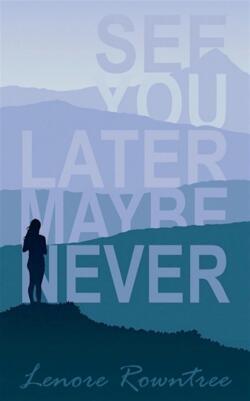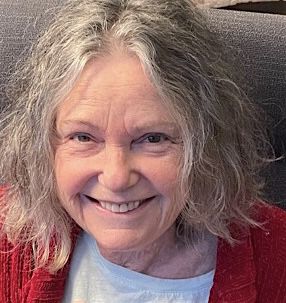1730 The Vanessa papers
See You Later Maybe Never
by Lenore Rowntree
Surrey: Now or Never Publishing, 2022
$19.95 / 9781989689400
Reviewed by Amy Whitmore
*
 What does a tough, creative woman do when she retires to join her husband (and to avoid accepting her new “ageist” position in the fashion industry) in his retirement? Turn into a lust-struck stalking teen that results in a series of humiliations?
What does a tough, creative woman do when she retires to join her husband (and to avoid accepting her new “ageist” position in the fashion industry) in his retirement? Turn into a lust-struck stalking teen that results in a series of humiliations?
Tell her husband out of the blue “I’m tired of your face?”
Meet Vanessa, Lenore Rowntree’s un-self aware main character in See You Later Maybe Never, an apt title that sets the tone for the last third of Vanessa’s life: caustic, funny, hint of life lessons learned, until the next time.
We all know a Vanessa, immaculately dressed, trying to dig up enthusiasm for hobby after hobby but stymied by her inner critical running commentary. Or maybe we are a Vanessa, with that critical interior monologue locking us inside ourselves. This Vanessa again and again keeps her own feelings at bay by criticizing others, such as the best woodworker in her woodworking class, Ernesto — “she can’t blame Luke for not wanting to move too close — wine and salami breath with overtones of coffee for sure. She can tell that much just by looking at his swarthy neck beard.” The young instructor, Luke, she lusts after to the point of an ill-considered drive to the hamlet where he lives, accidentally knocking down his business sign in the pouring rain, going off the road, and learning that all her fantasies about him were based on — lust. Who she needed him to be. By the end of the class she also discovers that Ernesto does not smell as she assumed and has more pain in his life than she’d understood.
This first story in the series of stories about Vanessa’s life sets up how she operates her entire adult life: stereotyped observations that she must accept were false.
The novel’s structure is similar to Elizabeth Strout’s Olive Kitteridge in that it is written as a series of short stories. However, Rowntree further organizes the stories into three parts: Then, Before Then, and Later.

In Part One, “Then,” Vanessa continuously comes up against herself, yet in the end reluctantly accepts her social miscalculations. She retires. She ends her affectionate marriage in the belief that Tom was a choice of safety, not of her true inner Bohemian self which, in fact, the reader can see is not who she is. Echoes of Robertson Davies’ Old Ontario mindset — too proper, too prim, too critical — influence her behaviour and responses. She tries courses and hobbies but is too cynical to make the most of them, until in “Gladiola Island” where, despite herself, she comes away with a bit more of a sense of how to be, and some well written lines for a poem.
Part Two, “Before Then,” takes the reader to Vanessa’s youth and early adulthood. The treat to the reader of writing a life in short stories is that one isn’t suddenly thrust into the past after being immersed in the present, breaking the feel of being inside the story. The end of the short story is clear cut, the beginning of the next could be anything. The disadvantage is that the writer is asking the reader to believe that what you are feeling and discovering within the stories of the youth are believable antecedents to the adult to whom you have been introduced.
Is Rowntree convincing? Yes and no. Vanessa is revealed as an earnest, naïve and socially out of touch girl in a family that pays little attention to her, so it stands to reason that she became a socially inept — people do not react warmly to her — adult despite the veneer she learns. Where, though, did she develop that caustic veneer? And she lives with her free spirit, love-life aunt for over a year in her teens, whom she loves and admires, but does not emulate. This is curious as she comes to believe the man she married was her “safe” choice who over time stifled the free spirit she was meant to be.
Her sexuality is awakened in this section, in a lovely and heart-breaking way:
She pulls the broom back into herself and kisses it, opening her mouth like she’d seen Julie Christie do in the movie “Darling.” She sweeps the dirt into a corner behind the side door, and with a mix of faery dust, dead rock stars, and a red Volkswagen bus in her head walks out of the garage, down the driveway and toward the tennis courts.
And into the truck of the bad boy who really does — she is stunned to experience — remove her tank top on their first (and last) time together, and tosses it behind the seat for her to retrieve as he drives her home.
Vanessa tries teaching before going into fashion design, and her observations about students come from both an astute older teacher and looking through the lens of her own sexuality. We do not see any hint, though, of the free spirit Vanessa later believes she should have been, finding the pubs and clubs and art scene of Orillia and partying, but a young woman who goes home every night to a chilly, run down apartment waiting for spring, when she takes a bus tour. We do see her deeper morality and caring when she paints “Sam Crowe Finally Graduated — 1982” on Orillia’s water tower after the murder of the Indigenous student, to whom she is attracted and also respects, by a jealous, successful white fellow student.

As an up and coming fashion designer in Victoria, she falls madly in love with a bass player, and the reader can see her Old Ontario limitations infusing the relationship with an unsuitable man; and that Tom, the laid back, affectionate man she married, was the suitable choice.
It is in this section, too, that the reader is suddenly given the POV of another character. The bass player gets his say as to where his hangups come from and how Vanessa in the end is just too staid for him. It is initially jarring, but ultimately works.
We see how Vanessa matures from the young woman, who allowed the bass player to take over her whole life, including her own sewing area so important to her creativity, to an older woman who, once she divorces her husband, never lets anyone else live with her again. This is a theme worth exploring as we read over and over about loneliness in older age being as toxic as obesity, drinking, etc.
Unfortunately, this theme is given short shrift in “Start Anywhere,” a story in Part Three. Vanessa finds a lover, but the relationship ends after 12 years when he returns to his wife and daughter, who has always referred to Vanessa as “a piece of work.” She is not the only character in the book to find Vanessa cold. This is a short, short story in which Vanessa and Leon’s meeting should have been abbreviated and their subsequent relationship explored. Vanessa refuses to let him move in with her! Independent woman making her own choices. How does this play out with a man who in the end returns to his wife? How much does Leon pressure Vanessa? How does she rebuff him?
In this part there is also a story from the POV of Tom, Vanessa’s ex-husband, in which he reveals the new love he finds with a woman the opposite of Vanessa — energetic, bigger than life, embracing life. This is the version of herself (except perhaps the weight and t-shirts) for whom Vanessa left Tom. Tom is a much more sympathetic character than Vanessa and we are happy for him.
Yet even after their divorce Tom is the man who understands Vanessa. In “Hunting Season” (in Part Three), it is Tom who helps her articulate and carry out her need to properly bury her image of the bass-player’s baby she long ago aborted.
Vanessa, for all her brittleness, is a character with whom the reader can empathize: her interior dialogues and difficulty in acquiring self-knowledge, and so living a fuller life, are familiar to many.
I found Part Three too rushed, and so a disappointment. Vanessa uses healing stones — since when did she become so New Agey? We don’t see anything of 12 years with Leon, and then he’s left her. She moves her Aunt Marion into a nursing home and accepts that not being able to have children after the abortion is, to her, a failure, despite the successful career she had. When did she spend time mulling that over? This synopsis of deeper reveals in Vanessa’s life as she lives into her mid-seventies — and maybe much longer — deserves more. Our later decades are not necessarily the serene sailing we assume they will be, but still a struggle with ourselves, our relationships, and the world around us. We may continue to be hurt and learn, or not.

See You Later Maybe Never is one of a plethora of worthy books that may never win the Booker Prize but deserve to be read for their insights into what are still universal perspectives. What is even better is that this book is about a woman’s years and experiences and realizations from ages 55 to 76. Many of us are in that category — 4.9 million are now aged 55 to 64 in Canada — and few of our lives are written. Mostly the writing in See You Later Maybe Never is coherent and “on the nose,” with funny one-liner observations thrown in. In “Gladiola Island,” for example, a fellow member of the writing workshop, who has been recording in a Dragon-Cyber-voice [speech recognition] on her laptop — which the workshop leader does not allow — says, “‘Thank you for letting me share the adventure of my life.’ Vanessa imagines what the words would sound like in a Dragon-cyber-voice.”
*

Amy Whitmore: Creative non-fiction published in Black Dog Review, NB Reader, Vancouver Sun and on CBC Radio Saint John. Summer radio play commissioned by CBC Saint John. Co-winner of Atlantic Film Festival’s Script Development competition, feature category. Mary Walsh chose to read the most eccentric character. Recipient of UBC’s Jacob Zilbur Scholarship for Most Promising Screenwriter and Maxine Sevack Memorial Scholarship in Creative Non-fiction. Currently working on short stories and a novel. Master gardener student, experienced hot air balloon crew, roamer by bike of Calgary’s pathways and byways.
*
The British Columbia Review
Publisher and Editor: Richard Mackie
Formerly The Ormsby Review, The British Columbia Review is an on-line book review and journal service for BC writers and readers. The Advisory Board consists of Jean Barman, Wade Davis, Robin Fisher, Barry Gough, Hugh Johnston, Kathy Mezei, Patricia Roy, Maria Tippett, and Graeme Wynn. Provincial Government Patron (since September 2018): Creative BC. Honorary Patron: Yosef Wosk. Scholarly Patron: SFU Graduate Liberal Studies.
“Only connect.” – E.M. Forster
3 comments on “1730 The Vanessa papers”